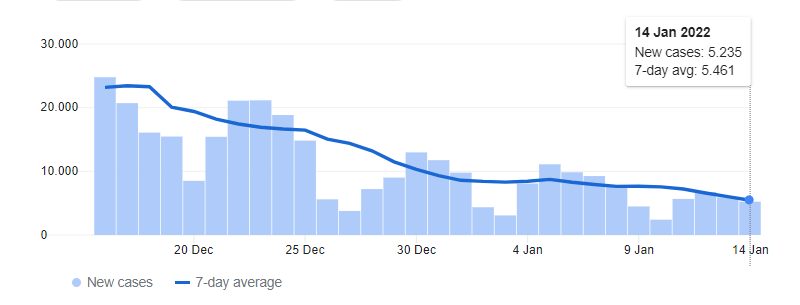Covid is ‘crashing’ as Omicron increasingly acts as a natural vaccine: Mild or no coronavirus symptoms yet all the antibodies

Covid scientist are increasingly convinced the Omicron variant is acting as a natural vaccine for tens of millions of people around the world as most infected people have no or very mild symptoms, yet their bodies do produce full antibodies.
Many countries are currently seeing record numbers of infections, including the UK, US, most of Europe and Asia, but hospital admissions only show a modest or even no serious increase.
In South Africa, where Omicron was first detected in November, infection rates are dropping rapidly and most experts believe the Omicron wave has passed and other countries should expect the same cycle in the next few months.
The high level of contagiousness, paired with very mild symptoms, may make Omicron a blessing in disguise, some Covid scientists argue. In fact, some go as far by suggesting there may no need to get vaccinated anymore, just get Omicron.
Dr Vishal Sehgal, president of medical services at Portea MeMedical in India, told the Times of India that “Omicron acts as a natural vaccine and proves beneficial as it is less life-threatening.”
Tail end of the pandemic?
A number of experts around the world are convinced the world is currently seeing the tail of the pandemic, based on other virus outbreaks in history.
Dr Namita Jaggi of Artemis Hospitals in India told various media outlets that “pandemics have traditionally speaking petered out by having variants that are milder and less severe till they finally die out.”
“So no, Omicron is not a cause of concern, rather we must optimistically hope that we are moving towards the end of the pandemic,” Jaggi said.
‘We are moving towards the end of the pandemic
Dr Namita Jaggi
Nicanor Austriaco, a Filipino-American molecular biologist, also believes Covid may slowly be killing itself off with the milder Omicron variant.
During a Town Hall meeting, last week, he said that those infected with Omicron will have antibodies that “will protect them against Delta, Gamma, Beta, Alpha and D614G” variants.
“This variant is the beginning of the end of the pandemic that has crippled the global community for two years already,” Austriaco told The PhilStar newspaper last week.

“As the virus rapidly increases, it’s going to try to spread to everyone and it’s going to try to find as many of our vulnerable. It is spreading so rapidly, what you will expect it will run out the ‘food’ soon.”
“And when it runs out of food, it will begin to crash, which is what you see in South Africa, the numbers are crashing.
“In London, the numbers are beginning to fall only because it spreads like wildfire, and when all the trees are burned, there’s nowhere for it to go. So it begins to crash.”
Nicanor Austriaco – molecular biologist
“We have to realize that Omicron is the beginning of the end of the pandemic because Omicron is going to provide the kind of population immunity that should stabilize our societies and should allow us to reopen,” Austriaco added.
In addition to that, pulmonologist Dr Puneet Khanna said that “viruses tend to evolve towards a less severe strain that can be easily transmitted but is less fatal.”
“Making humans very sick is not in the interest of the virus.”
Dr Puneet Khanna
“Thus, there is hope that in the future, the strain will turn weaker and cause a mild infection quite similar to common flu. But it has to be remembered tthat viruses keep on mutating and so later versions may get even dangerous mutations or become even milder,” Khanna told the Times of India.
Path out of Omicron
The latest figures in South Africa and a number of other countries, may offer the rest of the world a way out of Omicron, argued Salim Abdool Karim, one of South Afrcia’s most important infectious-diseases scientists.
He is convinced that “every other country, or almost every other, will follow the same trajectory.” The rate of new infections has consistenly dropped over the last 30 days.

Karim, who has led the pandemic response in South Africa, also told various media the peak of the Omicron wave has passed, comparing the wave of cases to Africa’s highest mountain.
“If previous variants caused waves shaped like Kilimanjaro, omicron’s is more like we were scaling the North Face of Everest,” Karim said, referring to the near-vertical jump in infections that South Africa experienced during the final weeks of November and first two weeks of December.
His peer, the chairwoman of the South African Medical Association, Dr. Angelique Coetzee, a household name in South Africa, could not agree more: the country is “over the curve and [infection] numbers are much lower,” she said.
Looking at the data coming out of Southern Africa and the UK, Marc van Ranst, a Belgian professor of virology at Leuven University and the Rega Institute for Medical Research. said that “the omicron variant is less pathogenic but with greater infectivity, allowing Omicron to replace Delta, this is very positive.”
“It is extremely important we need to closely monitor the clinical data of Omicron patients in South Africa and worldwide,” Van Ranst stressed.
Finally, another well-known virologist in Africa, Michelle Groome, of the National Institute of Communicable Diseases (NICD), equally told multiple news outlets that “we have surpassed the peak of infections.”
Groome cited figures from the NCID showed that new cases dropped by nearly a quarter over the past seven days, following another 14 per cent drop the previous week.
There are currently no restrictions in South Africa. Restaurants, shops, cinemas, malls, bars, coffee shops and gyms are all open, both indoors as well as outdoors.
Most transmissible variant
Despite reasons to be cautiously optimistic, physician Leonard Pascual did warn that “Omicron is the most contagious variant yet of the Covid-19 virus. Don’t let anyone win you over with the narrative that is a cure-all, end-all, ‘vaccine.’ It’s still Covid.”
In fact, only “a whiff of infected breath” is enough to catch the most transmissible variant of coronavirus, a leading scientist warned earlier last week.
Professor Peter Openshaw, who sits on the UK’s New and Emerging Respiratory Virus Threats Advisory Group (Nervtag), stressed how infectious Omicron is.
“We’ve had several iterations of this virus going through different stages of its evolution,” he said.
“We’re lucky really that it wasn’t this infectious when it first moved into human-to-human transmission.” Professor Peter Openshaw
To prevent new variants from emerging or prevent variants like Delta or Omicron from further adaptation, “take away the virus’ opportunity to replicate,” Canada-based Dr. Angela Rasmussen wrote last week.
“That means stop transmission to new hosts. Fewer new cases = less replication = less mutation = fewer variants emerging. So, as the article says, we need to reduce community transmission, increase surveillance and test/trace capacity, and address this while still rare,” she warned.

Explainer: Omicron vs Delta — what more we know about the new Covid-19 variant
The new variant is likely far more transmissible than Delta but studies suggest it may be less severe.
Two years into the pandemic, the only thing we are certain of is the ever-changing, ever-mutating nature of the Sars-CoV-2 virus that causes Covid-19. Since the start of the outbreak in December 2019, the virus has spawned a series of variants named after Greek alphabets Alpha, Beta, Gamma, Delta and now, Omicron.
The World Health Organisation (WHO), while labelling the new variant as Omicron, classified it as "highly transmissible" in November 2021. Since then, the variant has wreaked havoc in several countries, driving their number of cases to record highs.
Even as case numbers rise across the world — the United States has recently been averaging 800,000 new infections every day — health experts have predicted that the Omicron death toll may remain lower than the devastation caused in previous waves, particularly the one driven by Delta.
The discovery of Omicron
The new variant of the coronavirus was first detected in South Africa at the end of November last year, with scientists saying it was behind the spike in infections in the country. As with other variants, some infected people display no symptoms, South African experts had said at the time.
Shortly after, the WHO named the new variant Omicron and classified it as "highly transmissible".
The variant has about 50 mutations not seen in combination before, including more than 30 mutations on the spike protein the coronavirus uses to attach to human cells. Vaccines in current use target that spike protein, according to a Reuters report. This means protection provided by Covid-19 vaccines may be less effective on Omicron.
How transmissible is Omicron?
One of the earliest studies on the transmissibility of Omicron, conducted by researchers in the United Kingdom, revealed that the new variant was two to three times more likely to infect people, specifically in household settings, as compared to Delta.
Associate Professor of Epidemiology at Harvard's T. H. Chan School of Public Health, Bill Hanage, said Omicron was expected to show a tendency to clustered transmission in large gatherings.
A more recent study conducted in France suggested that Omicron may be 105 per cent more transmissible than Delta. The study, which analysed over 131,000 samples but is yet to be peer-reviewed, noted that even if the severity of Omicron was reduced compared to Delta, the higher reproduction number — the number of people in a population who can be infected by an individual at any specific time — meant that French hospitals may see higher activity, if not overloading.
Another factor that sets Omicron apart is the increased risk of reinfection. A study by Imperial College London showed that Omicron was 5.4 times more likely to reinfect than Delta.
In a recent press conference, WHO's technical lead on Covid-19, Maria Van Kerkhove, said Omicron was "efficiently transmitting" and being detected in all areas with good gene sequencing options.
Explaining why Omicron has led to a massive jump in case numbers, Kerkhove said the virus was able to adhere to human cells more easily because of its mutations, cause reinfection, and replicate in the upper respiratory tract, which she said, set it apart from other variants like Delta.
"This combination of factors allowed the virus to spread more easily. With Omicron, what we're learning is that your risk of getting severe disease is less than it is for Delta," she said. The infectious diseases expert cautioned, however, that the global health body was still seeing a rise in the number of hospitalisations and people who needed clinical care which would put pressure on countries' health systems.
What about severity?
While the number of infections is significantly higher, the rates of deaths, and even hospitalisations, are much lower when compared to Delta.
This is backed by several studies, including one conducted by South African scientists that found people diagnosed with Omicron over a period of two months were 80pc less likely to require hospitalisation than people infected with other variants. The scientists, however, said that a high level of immunity was partly behind the reduced need for hospitalisation in the country.
One of the study's authors, Professor Cheryl Cohen of the National Institute for Communicable Diseases, said, "Compellingly, together our data really suggest a positive story of a reduced severity of Omicron compared to other variants."
Separately, the UK Health Security Agency's research found the risk of hospitalisation after being infected with the Omicron variant was half as that with Delta. In addition, their study said that the risk of hospitalisation was reduced by 81pc in people who had received two and three doses of a Covid-19 vaccine compared to unvaccinated people.
In Scotland, researchers at the University of Edinburgh found that the number of Omicron patients who needed to be hospitalised was 68pc less compared to Delta. However, their study also underscored the increased risk of reinfection — 7.6pc of the samples analysed were reinfections compared to 0.7pc with Delta.
Yet another study, conducted by Imperial College London, suggested that the risk of hospitalisation for Omicron patients was 40 to 45pc lower compared to the Delta variant.
Earlier this month, Portuguese Prime Minister Antonio Costa said it was "evident that Omicron is less severe" as he announced the easing of curbs despite a record rise in cases.
Closer to home, Indian health officials said that only five to 10pc of patients in the current wave driven by Omicron have required hospitalisation in contrast to 20 to 23pc in the previous wave driven by Delta.
However, hospitalisations have not remained low in all countries. There were 132,646 people hospitalised with Covid on Jan 10 in the United States, surpassing the record of 132,051 set in January 2021.
Elsewhere, hospitalisations in France have seen their biggest increase since April 2021 but remain below the peaks set at the end of 2020. The country's health minister said Omicron leads to less severe complications but hospitalisations were still increasing because it was highly infectious.
Read: N95, surgical or cloth — Is one face mask better than the other for optimum protection against Omicron?
Omicron affects airways, not lungs
Experts say one reason behind the reduced severity may be that Omicron multiplies faster in the airways and lower in the lungs.
According to researchers at the University of Hong Kong, "at 24 hours after infection, the Omicron variant replicated around 70 times higher than the Delta variant and the original Sars-CoV-2 virus. In contrast, the Omicron variant replicated less efficiently (more than 10 times lower) in the human lung tissue than the original Sars-CoV-2 virus, which may suggest lower severity of disease."
However, it cautioned that the overall threat from the variant was "very significant" because of its increased transmissibility.
According to a report by The Guardian, six separate studies found that Omicron does not cause as severe damage to the lungs as Delta and other variants.
Last week, WHO Incident Manager Abdi Mahamud, too, said more evidence was emerging that Omicron caused less severe illness because it affected the upper respiratory tract.
"We are seeing more and more studies pointing out that Omicron is infecting the upper part of the body unlike the other [variants] that could cause severe pneumonia," he was quoted as saying by Reuters.
Do existing vaccines offer protection against Omicron?
While protection against Omicron may wane a few months after receiving two shots of a vaccine, multiple studies showed that getting a booster dose produces antibodies capable of fighting the new variant.
Early findings from a real-world analysis suggested that the risk of catching Omicron was "significantly reduced following a booster vaccine", Head of Immunisation at the UK Health Security Agency Dr Mary Ramsay said.
"Two doses of AstraZeneca or Pfizer-BioNTech vaccines provided much lower levels of protection against symptomatic infection compared with what they provide against Delta.
"However, when boosted with a dose of Pfizer vaccine, there was around 70pc protection against symptomatic infection for people who initially received AstraZeneca, and around 75pc protection for those who received Pfizer," according to a Reuters report.
Studies conducted later also pointed to the same conclusion — booster doses offer protection against Omicron.
Danish researchers found that vaccine effectiveness for those who had received a shot of Pfizer or Moderna was re-established when they were given a booster dose of the Pfizer vaccine.
Research carried out by the pharmaceutical companies themselves has also shown encouraging results. Pfizer said a three-course shot of its vaccine was able to neutralise the Omicron variant in a lab test. Its CEO also said that the company is working on an Omicron-specific vaccine that will be ready by March.
Moderna said a booster dose of its vaccine appeared to be effective against Omicron, adding that it "boosts neutralising antibody levels 37-fold higher than pre-boost levels".
A study by the University of Oxford, while supporting a third dose of AstraZeneca's vaccine, concluded it had boosted neutralisation levels.
However, research on more doses of Chinese vaccines — Sinopharm and SinoVac — has not been as encouraging.
A joint study conducted by the University of Hong Kong and the Chinese University of Hong Kong showed that "third dose of [SinoVac] given to those who received two previous doses of [SinoVac] does not provide adequate levels of protective antibody."
Researchers from Shanghai Jiao Tong University and a Shanghai-based lab specialising in respiratory infectious diseases found that Sinopharm's vaccine had "significantly lower" neutralising activity against the Omicron variant although they added the vaccine's efficacy against Omicron remained unclear.
A later study suggested that a protein-based vaccine produced by Sinopharm "significantly improved the immune responses against various Sars-CoV-2 strains, including Omicron" when administered after two doses of the original vaccine.
Other treatments are also available this time around. The US Food and Drug Administration (FDA) has approved two anti-viral pills — from Pfizer and Merck — that could be an important tool against Omicron.
Both companies said they expect their pills to be effective against the new variant.
No comments:
Post a Comment